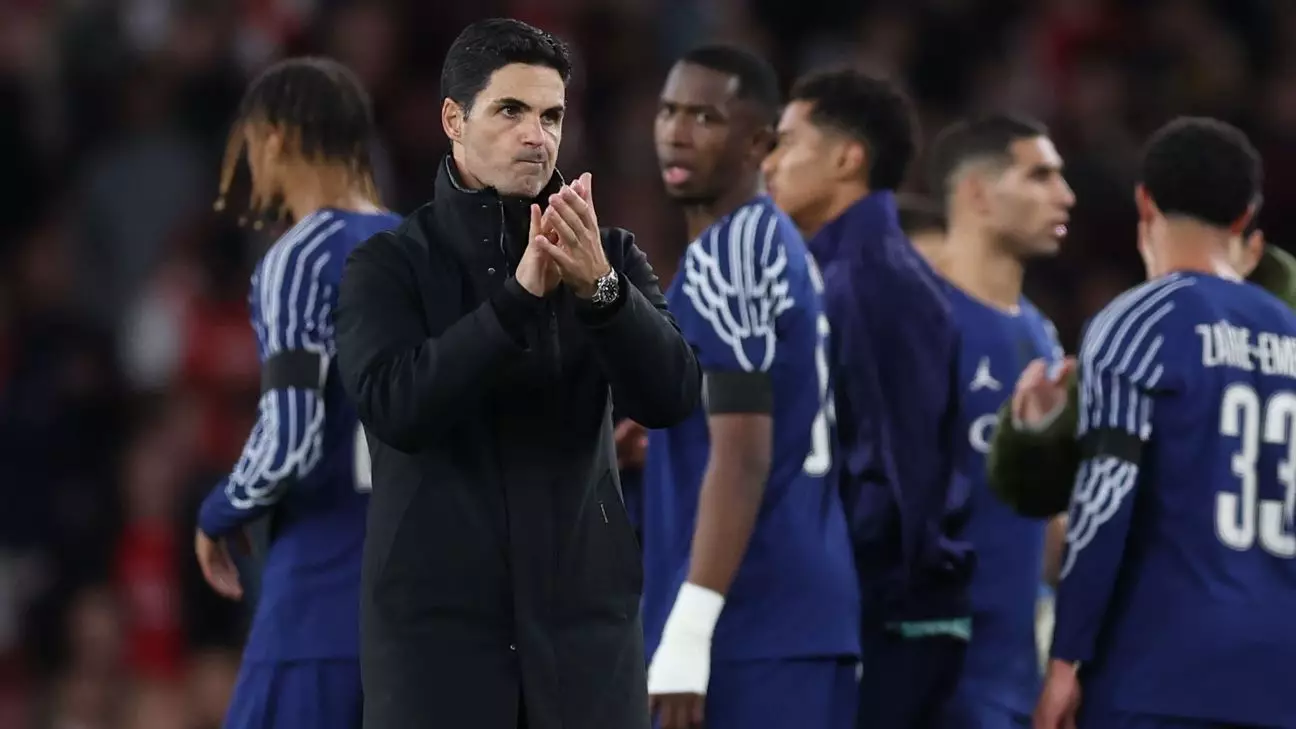As Arsenal prepares for a pivotal clash with Paris Saint-Germain (PSG) next week, the atmosphere brims with anticipation and determination. Mikel Arteta, Arsenal’s tactician, has called for his squad to deliver a remarkable performance that could secure a place in the Champions League final. After a narrow defeat at home, where a quick strike from Ousmane Dembélé proved to be the decisive moment, Arsenal faces the daunting task of overcoming a goal deficit on enemy turf—something that has typically haunted them in past Champions League campaigns.
Arteta’s plea for his players to conjure something extraordinary underscores the significance of resilience in high-stakes football. It’s not merely about the talent on the pitch; it’s about the mindset of players who must rise above previous disappointments. Historical precedents have often loomed large over Arsenal’s European aspirations, particularly their fateful journey to the final in 2006, which ended in heartbreak against Barcelona. Yet those memories can either weigh heavily on the team or serve as a powerful motivator, igniting a fire to rewrite their narrative.
The Importance of Mental Fortitude
Mental fortitude is pivotal in football, especially in knockout tournaments where a single misstep can seal one’s fate. Arteta’s insistence on a special performance isn’t unfounded; it reflects an understanding that nuances can determine outcomes at this level. Reflecting on their earlier triumph against Real Madrid—where they overcame a three-goal deficit—Arteta’s message is clear: belief and strategy need to coalesce to transform a challenging game into a victory.
Critics may argue that Arsenal’s historical struggles in crucial encounters eliminate them from consideration as Champions League contenders. Yet, the team’s resolve, as articulated by goalkeeper David Raya, reveals a mindset inclined towards optimism. He emphasizes their capability to clinch victories away from home, a notion that could act as a catalyst in filling his teammates with renewed confidence. For Arsenal, the challenge in Paris transcends merely shifting the scoreboard; it’s about harnessing their collective energy to stroke the flames of hope.
Turning Defensive Dilemmas Into Opportunities
Arsenal’s defensive lapses at the Emirates were highlighted by PSG’s potent attacks and, notably, Gianluigi Donnarumma’s heroics in goal. Though Arsenal couldn’t capitalize on opportunities, it’s essential to examine the broader implications of those missed chances. Each save from Donnarumma didn’t just preserve a lead for PSG; it revealed vulnerabilities in Arsenal’s offensive execution. Addressing these flaws will be imperative for Arteta, who must guide his players toward a balanced approach of attack and defense.
Returning from suspension, Thomas Partey might provide the stability and experience required in the midfield to control the pace of the match. His presence could also allow for a more dynamic attacking structure, crucial in dissecting PSG’s backline. However, the responsibility also falls on younger players like Gabriel Martinelli and Leandro Trossard—to take chances not just when they are presented, but to create opportunities where none seem to exist.
A Catalyst for Change
The semifinal second leg promises to be more than just a football match; it represents a pivotal chapter in Arsenal’s quest for validation on Europe’s grand stage. If Arsenal is to reclaim their standing as a footballing powerhouse, the upcoming encounter must serve as proof of their evolution—a galvanizing display that transforms potential into victory. The stakes have never been higher, but neither have the rewards. With Arteta at the helm, Arsenal stands not just poised to challenge PSG, but also on the brink of redefining their legacy in the Champions League narrative.

